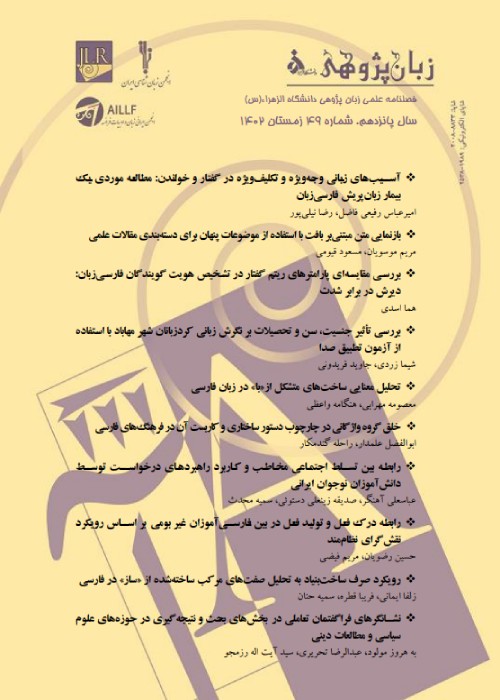speech act of criticism from a sociolinguistics point of view
Author(s):
Article Type:
Research/Original Article (دارای رتبه معتبر)
Abstract:
The study is set up to see how participants deal with interpersonal interaction when they criticize their classmates and professors as interlocutors. This concerns lower-to-higher status with great social distance between professors and students compared to equal status and neutral social distance pertaining to the classmates. The study is concerned with the pragmalinguistic patterns, realization and mitigation strategies that the participants apply to criticize their interlocutors.
Criticism implies ones dissatisfaction with a quality in someone or something. Criticizing implies voicing an objection or appraising the faults in somebody or something. Speech act of criticizing as a face-threatening act has been the focus of few studies (Nguyan 2005a, 2008, 2013). This neglected speech act has already been the focus of some studies but in a restricted way in terms of type and applied strategies. L2 criticism has been studied with respect to giving critical feedback on the learner peer correction of written papers in writing courses (Nguyen, 2005a, 2005b, 2008a, 2008b). This article aims to explore how Persian NSs perform facework to achieve politeness when they criticize their interlocutors. The researchers want to investigate the topics along with the features that characterize politeness among Persian NSs with regard to mitigating the face-threatening aspect of giving criticisms. This is an attempt to discover common issues and patterning of genuine criticisms (GCs) as they are used among native speakers of Persian in and around the University of Razi community. It explores how Persian NS students in relation to their professors and classmates realize and mitigate the speech act of criticism. The case study consisted of 200 adult B.A and M.A university students. They were all students from two universities in a western province of Iran, and the towns nearby, aged between 19 and 27 (Mean = 23). The participants were 105 females and 95 males. The themes of GCs and the level of seriousness of the topic of GCs vary according to the relationship between the participants. Three important interlocutor variables that are supposed to affect GC exchanges are gender, social distance, and power status. The manner in which interlocutors perform criticism is directly related to the interlocutor status, their relationship, and gender. Both male and female participants in the study seem to have similar general tendencies in terms of criticizing their interlocutors with equal status and little social distance. Nevertheless, they are different in terms of the strategies that they apply toward their higher status interlocutors with larger social distance. The strategies that male group use for criticizing their higher status professors are subcategories of direct/explicit strategies; however, the female group use indirect/implicit strategies. The findings indicate that male participants have the tendency to introduce their point of criticisms, i.e. use steers, regardless of the status and distance of their interlocutors. While female participants are inclined to soften the act of criticism by using consultative strategies. The relationship between GC strategies and social status of the interlocutors seems weaker than the relationship between GC strategies and gender. In comparing the results for interlocutors of equal status, it is apparent that for equal status participants the percentage of implicit strategies is higher than the percentage of explicit ones. It seems that in studied community it`s not appropriate for females to criticize their interlocutors directly when they are from higher social status, compared to the ones from lower social status. You would reasonably expect female speakers from lower social status to be more constrained when the addressee is from higher status. But for male participants, a combination of explicit and implicit strategies are employed. Similarly, equal status participants draw mainly on implicit strategies to realize GCs. All in all the findings indicate that male participants have the tendency to introduce their point of criticisms regardless of the status and social distance of their interlocutors. While, female participants are inclined to soften the act of criticism by giving suggestions, complimenting, or making requests i.e. they actually apply consultative strategies.
The analysis of mitigation strategies to soften the negative impact of GC also shows that it may function positively in social interchanges and lead to creating a sense of solidarity between participants through strategies of complimenting and requesting. GC may function negatively when it is only a negative evaluation of the hearer, or it may serve to seek agreement between interlocutors. This study has implications for language pedagogy: awareness of social patterns underlying GCs is important for non-native speakers; by means of such patterns they learn how to criticize Persian native speakers appropriately, and, moreover, it increases their opportunities to interact with Persian native speakers.
Criticism implies ones dissatisfaction with a quality in someone or something. Criticizing implies voicing an objection or appraising the faults in somebody or something. Speech act of criticizing as a face-threatening act has been the focus of few studies (Nguyan 2005a, 2008, 2013). This neglected speech act has already been the focus of some studies but in a restricted way in terms of type and applied strategies. L2 criticism has been studied with respect to giving critical feedback on the learner peer correction of written papers in writing courses (Nguyen, 2005a, 2005b, 2008a, 2008b). This article aims to explore how Persian NSs perform facework to achieve politeness when they criticize their interlocutors. The researchers want to investigate the topics along with the features that characterize politeness among Persian NSs with regard to mitigating the face-threatening aspect of giving criticisms. This is an attempt to discover common issues and patterning of genuine criticisms (GCs) as they are used among native speakers of Persian in and around the University of Razi community. It explores how Persian NS students in relation to their professors and classmates realize and mitigate the speech act of criticism. The case study consisted of 200 adult B.A and M.A university students. They were all students from two universities in a western province of Iran, and the towns nearby, aged between 19 and 27 (Mean = 23). The participants were 105 females and 95 males. The themes of GCs and the level of seriousness of the topic of GCs vary according to the relationship between the participants. Three important interlocutor variables that are supposed to affect GC exchanges are gender, social distance, and power status. The manner in which interlocutors perform criticism is directly related to the interlocutor status, their relationship, and gender. Both male and female participants in the study seem to have similar general tendencies in terms of criticizing their interlocutors with equal status and little social distance. Nevertheless, they are different in terms of the strategies that they apply toward their higher status interlocutors with larger social distance. The strategies that male group use for criticizing their higher status professors are subcategories of direct/explicit strategies; however, the female group use indirect/implicit strategies. The findings indicate that male participants have the tendency to introduce their point of criticisms, i.e. use steers, regardless of the status and distance of their interlocutors. While female participants are inclined to soften the act of criticism by using consultative strategies. The relationship between GC strategies and social status of the interlocutors seems weaker than the relationship between GC strategies and gender. In comparing the results for interlocutors of equal status, it is apparent that for equal status participants the percentage of implicit strategies is higher than the percentage of explicit ones. It seems that in studied community it`s not appropriate for females to criticize their interlocutors directly when they are from higher social status, compared to the ones from lower social status. You would reasonably expect female speakers from lower social status to be more constrained when the addressee is from higher status. But for male participants, a combination of explicit and implicit strategies are employed. Similarly, equal status participants draw mainly on implicit strategies to realize GCs. All in all the findings indicate that male participants have the tendency to introduce their point of criticisms regardless of the status and social distance of their interlocutors. While, female participants are inclined to soften the act of criticism by giving suggestions, complimenting, or making requests i.e. they actually apply consultative strategies.
The analysis of mitigation strategies to soften the negative impact of GC also shows that it may function positively in social interchanges and lead to creating a sense of solidarity between participants through strategies of complimenting and requesting. GC may function negatively when it is only a negative evaluation of the hearer, or it may serve to seek agreement between interlocutors. This study has implications for language pedagogy: awareness of social patterns underlying GCs is important for non-native speakers; by means of such patterns they learn how to criticize Persian native speakers appropriately, and, moreover, it increases their opportunities to interact with Persian native speakers.
Language:
Persian
Published:
Language research, Volume:10 Issue: 27, 2018
Pages:
27 to 47
magiran.com/p1873485
دانلود و مطالعه متن این مقاله با یکی از روشهای زیر امکان پذیر است:
اشتراک شخصی
با عضویت و پرداخت آنلاین حق اشتراک یکساله به مبلغ 1,390,000ريال میتوانید 70 عنوان مطلب دانلود کنید!
اشتراک سازمانی
به کتابخانه دانشگاه یا محل کار خود پیشنهاد کنید تا اشتراک سازمانی این پایگاه را برای دسترسی نامحدود همه کاربران به متن مطالب تهیه نمایند!
توجه!
- حق عضویت دریافتی صرف حمایت از نشریات عضو و نگهداری، تکمیل و توسعه مگیران میشود.
- پرداخت حق اشتراک و دانلود مقالات اجازه بازنشر آن در سایر رسانههای چاپی و دیجیتال را به کاربر نمیدهد.
دسترسی سراسری کاربران دانشگاه پیام نور!
اعضای هیئت علمی و دانشجویان دانشگاه پیام نور در سراسر کشور، در صورت ثبت نام با ایمیل دانشگاهی، تا پایان فروردین ماه 1403 به مقالات سایت دسترسی خواهند داشت!
In order to view content subscription is required
Personal subscription
Subscribe magiran.com for 70 € euros via PayPal and download 70 articles during a year.
Organization subscription
Please contact us to subscribe your university or library for unlimited access!



